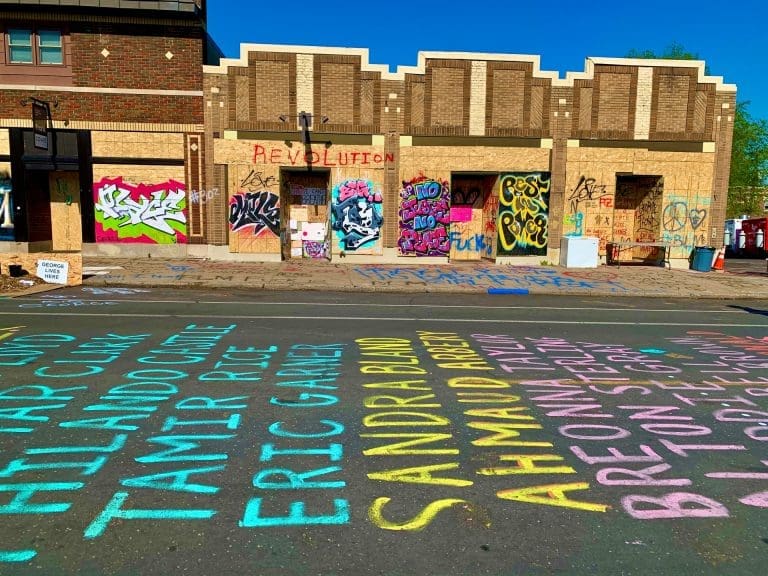It has been one year, and George Floyd’s heartbreaking final minutes on the paved city ground remain fresh on my mind. His gruesome and racist murder came as a global pandemic left us all already vulnerable and raw, and I was dealing with the sickness and stress it caused in my family and among my friends and community.
Many of us recall moments in our personal histories by their relation to the day Floyd was killed—or Trayvon Martin, Eric Garner, Michael Brown, Freddie Gray, Breonna Taylor and countless others. Long before Billie Holliday sang Strange Fruit, Black communities have been absorbing this pain and anguish.
“When a member of a minority group is killed, their whole community is forced to witness—not only through personal narratives of the victims, but through the imagery of the endless media (and social media) frenzy,” noted a December 2020 commentary produced by the National Neuroscience Curriculum Initiative in collaboration with Biological Psychiatry.
“This disproportionate display of minority victims in the news has been compared to lynchings, where slain African Americans are put on display for public consumption. These events convey the omnipresent threat of violence—that merely walking down the street or driving a car can be life-threatening.”
Race-Based Traumatic Stress (RBTS) is increasingly acknowledged by mental health practitioners as triggering symptoms including anxiety, depression or rage, as well as internalized racism.
Floyd Killing Highlights the Racial Wealth Gap
The murder one year ago has moved the nation toward long overdue racial reckoning to acknowledge our past and present, and collectively set a course for our future. But the killing also requires that we closely examine a related issue: the violence of the wealth gap in the US.
To understand the ripple effect of devaluing workers and removing their agency, we need look no further than Christopher Martin, the teenage clerk at Cup Foods who rang up a pack of cigarettes for Floyd. Martin accepted a $20 bill, and then realized it was fake.

Cup Foods employees understood their paychecks would be docked for the amount of any counterfeit bill they accepted. So, on the orders of his manager, Martin chased Floyd down outside the grocery, deli and convenience store at the corner of Chicago and 38th in Minneapolis.
When Floyd twice refused to return to Cup Foods, Martin offered to cover the $20 himself. Instead, the manager instructed another coworker to call the police, setting off the chain of events that led to the fatal encounter.
As officer Derek Chauvin implacably knelt on Floyd’s neck outside the store, ignoring Floyd’s calls for breath and his mother, security videos show Martin pacing, sometimes holding his head in anguish. “Disbelief and guilt”—this is how he later described his emotions.
“If I would’ve just not taken the bill, this could’ve been avoided,” Martin testified at Chauvin’s trial.
Martin’s life has been changed forever.
The Desperate Need to Fix a Broken Economic System
Let’s recall what was actually at stake when the police pulled up outside Cup Foods: twenty dollars and a pack of cigarettes.
New data from the 2019 Survey of Consumer Finances (SCF) released in September 2020 show that long-standing substantial wealth disparities between families in different racial and ethnic groups remain largely unchanged since the last survey in 2016; the typical White family has eight times the wealth of the typical Black family and five times the wealth of the typical Latinx family.
The federal poverty rate for Black Americans (about $25,700 for a family of four, which many economists feel is too low to give a true picture) sits at 20.8 percent, twice that for Whites, which is 10.1 percent, according to 2018 U.S. Census Data.
Two years before anyone tested positive for Covid-19 in the United States, a March 2018 intergenerational mobility study showed that Black children had the most difficult time achieving upward mobility when compared with White, Latinx and Asian children.
Other major contributors to rising inequality: CEOs earned about 320 times as much as a typical worker in 2019, because of their power to set pay and because so much of their pay is stock-related, but not because they are increasing productivity or possess specific high-demand skills. And the highest income 1 percent of Americans earn about one third of their income from capital investments, which are taxed at significantly lower rates than ordinary income.
The need to close this gap is increasingly undeniable. Last month, about 50 U.S. investor, business and civil society groups called on the Biden administration to reform business and finance rules to combat rising inequality as well as climate change.
The system is broken. We must take urgent steps to expand opportunities for more broadly shared prosperity, especially for those facing the greatest barriers.
We need systemic changes to tax codes that unfairly burden people like Floyd and permanently expand measures like the Earned Income Tax Credit. We need increased access to capital, technical support and mentoring for businesses that historically have been denied that. When we close the racial wealth gap, Black and Latinx families are more able to cover health costs, purchase nutritious food, support their children’s education and buy a home.
The Rockefeller Foundation believes that an inclusive economy allows people of all backgrounds and experiences to live with dignity, create a foundation for themselves and their families, and contribute to their communities’ health. The Foundation defines inclusive economies by five inter-related characteristics: participation, equity, growth, sustainability, and stability.
I’m proud that The Foundation is part of the effort to make our system more just. But the first anniversary of Floyd’s death is a time not for self-congratulations. Instead, let’s remember that a single act alone will not accomplish justice. And let’s recommit ourselves to the shared work needed to change this narrative forever.